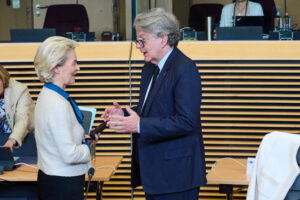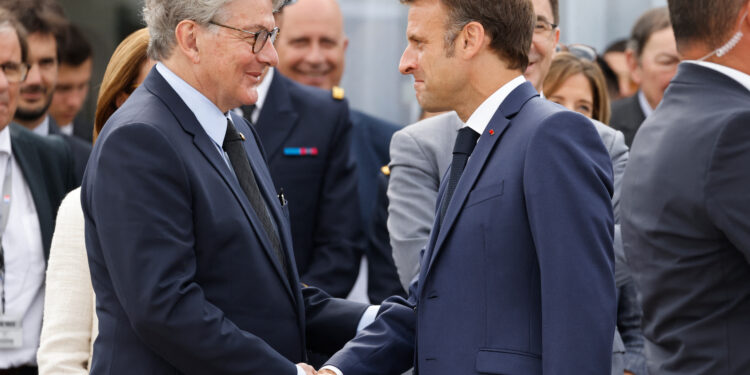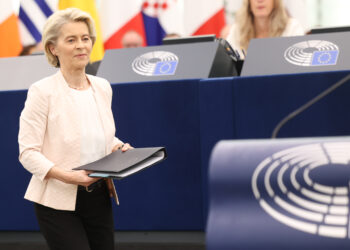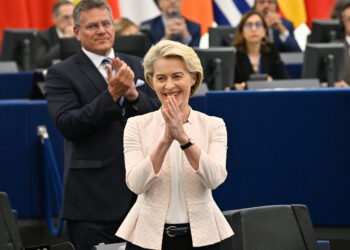Brussels – Another confirmation, perhaps the hottest one—at least in France. Although negotiations to form a new government are still in stalemate—with the priority of the Olympic Games absorbing public opinion—Thierry Breton has been confirmed by the French President, Emmanuel Macron, as candidate commissioner for the von der Leyen Commission. Although there is time until August 30 to submit nominations to Brussels, the Elysee tenant is pulling straight ahead and makes no concessions to the New Popular Front, the leading force in the National Assembly after the late June/early July snap elections.

“Thierry Breton, by virtue of his qualities and experience, especially during his previous mandate, has demonstrated general competence and commitment to Europe,” reads the letter addressed last Thursday (July 25) to the re-elected chairwoman of the EU Commission, Ursula von der Leyen, and made public today (July 30). Macron speaks precisely of his experience over the past five years in office at the Berlaymont, which “will enable him to continue to carry out independently the important responsibilities that you will want to entrust to him within the College.” It may not be controversial like the confirmation of Hungarian Olivér Várhelyi, but compared to those of his three other colleagues on the outgoing von der Leyen Commission (the Slovakian Maroš Šefčovič, the Latvian Valdis Dombrovskis and the Dutch Wopke Hoekstra) Breton’s appointment is bound to create quite a bit of controversy in Paris.
Jean-Luc Mélenchon, leader of La France Insoumise, the first party in the leftist coalition that defeated Marine Le Pen‘s Rassemblement National, had already anticipated this a few weeks ago in the European Parliament. Drawing parallels between today’s France and “the ancien régime, where the only rule was the prince’s pleasure,” Mélenchon cited the very example of the appointment of France’s future European commissioner: “Normally, if there is someone new to be appointed, the president of the Republic should take into account the election results,” but in France’s “presidential monarchy” “it is a question to ask the prince,” had been the radical leftist leader’s attack. Macron responded two weeks later, confirming the independent politician (but close to Macron’s liberals), former Minister of Economy, Finance and Industry (between 2005 and 2007) and since 2019 European Commissioner for the Internal Market.
Beyond Breton, the other nominations so far
In addition to Germany, which will express the presidency of the Commission with Ursula von der Leyen, and Estonia, which will see former Prime Minister Kaja Kallas become EU High Representative for Foreign Affairs and Security Policy (both nominations are the responsibility of the European Council, which made its choices at the June 27 summit of EU leaders), from the weeks following the European elections in early June to today have come the official nominations by the governments of Slovakia, Latvia, Slovenia, Ireland, Sweden, Finland, Netherlands, Czech Republic, Hungary, and France. It is worth mentioning, however, von der Leyen’s call for gender parity in nominations (that is, governments should submit a man’s and a woman’s name) to allow the re-elected President to compose a College with equal numbers of male and female commissioners. Exceptions are only governments that decide to confirm the outgoing commissioner, like France with Breton.

As for the ten names that have come in so far, Slovakia has reappointed the outgoing Executive Vice President of the EU Commission responsible for Interinstitutional Relations and the Green Deal, Maroš Šefčovič, who could thus make it to a fourth consecutive term. For the third time in a row, Latvia chose the outgoing executive Vice President from the EU Commission responsible for the Economy, Valdis Dombrovskis. On the other hand, a new name for Slovenia, which chose lawyer and economist Tomaž Vesel, former President of the National Audit Office and Fifa’s Audit and Compliance Committee.
For Ireland, there is the centre-right Fianna Fáil and former Minister for Public Expenditure and Reform (2020-2022) and Finance (2022-2024), Michael McGrath. The government of Sweden has decided to bet on the Minister for European Affairs, Jessika Roswall, while Finland on MEP Henna Virkkunen, who has sat in the ranks of the European People’s Party since 2014. Last in chronological order are the nominations by the new right-wing government of the Netherlands of the outgoing European Commissioner for Climate Action, Wopke Hoekstra, by the Conservative government of the Czech Republic of the incumbent Minister of Industry and Trade, Jozef Síkela, and by the Hungarian one of the outgoing European Commissioner for Enlargement and Neighborhood Policy, Olivér Várhelyi.

Italy‘s right-wing government chaired by Giorgia Meloni has not yet released its reservation on the official candidate, nor has it communicated when it will make it known. However, speaking exclusively to Eunews, Forza Italia’s delegation head to the EU Parliament, Fulvio Martusciello, said “The commissioner should be Minister Raffaele Fitto; we have already debated it extensively, and that will be.” Fitto is currently Minister for European Affairs, Cohesion Policies, and the NRRP, and an expression of the Fratelli d’Italia party, the major partner in the governing coalition with Forza Italia and the Lega that took office on October 22, 2022. He held the office of MEP between 1999 and 2000 and then between 2014 and 2022 (from 2019, co-chair of the European Conservatives and Reformists group), was President of the Puglia Region between 2000 and 2005, and Minister for the Regions and Territorial Cohesion between 2008 and 2011 in the last government led by Silvio Berlusconi.
English version by the Translation Service of Withub





![Jean Luc Mélenchon e Manon Aubry al Parlamento europeo [Ph: Simone De La Feld/Eunews]](https://www.eunews.it/wp-content/uploads/2024/07/IMG_9776-350x250.jpg)




![Un motoscafo in Svezia. Nell'Ue si pone un problema di mancato riconoscimento delle patenti nautiche [foto:
Matti Blume, Wikipedia Commons. Copyright: Creative Commons Attribution-Share Alike]](https://www.eunews.it/wp-content/uploads/2024/11/motoscafo-Saltsjoen_Stockholm_P1090679-120x86.jpg)
